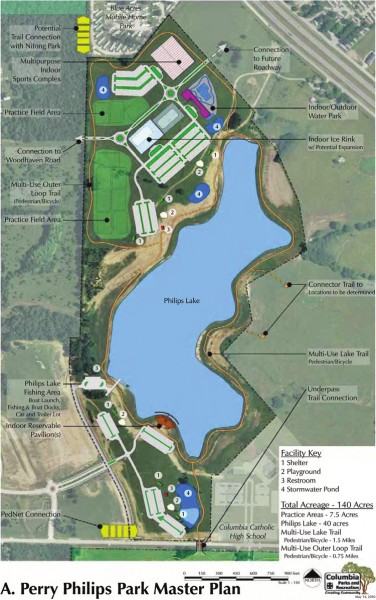Organizers cite need for gyms
by David Reed
April 29, 2011
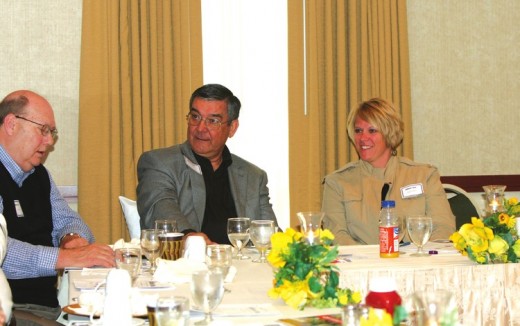
Projects at the new park will be funded by the one-eighth-cent sales tax that voters renewed last November for another five years. About $1.75 million of the $12 million in anticipated revenue for capital projects is to be allocated to Philips.
But that money will be spent on roads, parking lots, restrooms and, in about three years, six fields big enough for playing competitive soccer, football, lacrosse and baseball. It’s expected to take about 10 years and another positive vote on the parks tax to build the multi-sport gymnasium at Philips in the southeast corner of the city.
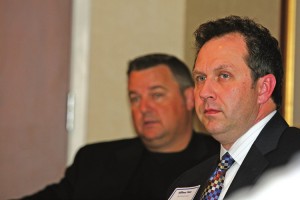
Youth sports tournaments bring more than $1 million to the local economy every year, according to the Convention and Visitor’s Bureau, through money spent by visitors at hotels, restaurants, gas stations and other local businesses.
But a shortage of gym space, along with regulation-size soccer and baseball fields, “has kind of stopped our forward momentum,” Julie Ausmus, director of the CVB’s Sports Development Fund, said.
The economic downturn, along with rising gas prices, seems to be causing a recent drop in attendance at long-established events in Columbia, organizers said. Ausmus added that there is intense competition among cities in Missouri and other states to attract sporting events.
“If we’re going to draw more people to Columbia, we need indoor facilities,” Ash said. “We can’t have tournaments because there are no facilities to hold them. People don’t come here, stay in a hotel, eat in a restaurant, to play basketball at Jeff Junior or one of the middle schools.”
There are about 1,000 children participating in the CYBA’s basketball program, which started in 1992, and they play in an assortment of school gyms and the city armory building.
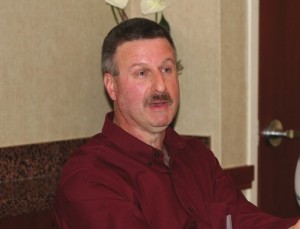
The CYBA has raised more than $200,000 for a multipurpose gym with eight basketball courts that the organization has been advocating for nearly six years. The Boone County Commission agreed to provide land at the fairgrounds for the $1.5 million recreational building for playing basketball, volleyball and other indoor sports.
But Jennings said the economic downturn appears to have caused the campaign to stall. “Quite honestly, it’s not going all that well,” he said. “It’s not a good time to be asking people for money. But we’re going to keep plugging away.”
The organization tried unsuccessfully a few years ago to rally support for a larger indoor gym next to the Columbia Area Recreational Center, and Jennings said in the “worst-case scenario, we’ll have a sum of money we can donate to the city to eventually build something indoors.”
Erika Coffman of the city Parks and Recreation Department said the shortage of courts will be helped somewhat by the addition of auxiliary gyms at each of the city’s three high schools.
Jennings said the issue boils down to the city’s spending priorities: “We can spend millions on parking garages downtown.”
Gary Kespohl, the City Council’s 3rd Ward representative, agreed and also lamented that he’s been unable to generate support for his idea of rebuilding the Maplewood Barn Theater in such a way to allow for four basketball courts.
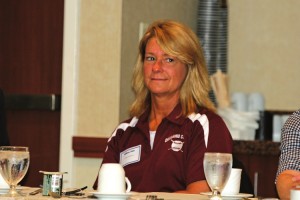
“There has to be a priority; it’s all about money,” Kespohl said. “If you can put up two multimillion-dollar garages downtown, it seems to me you can take the property next to the ARC and put up a huge indoor complex with a huge economic impact.”
Forum participants pointed out that the cost of garage construction is paid with fees collected by the parking utility and brought up the idea of forming some type of sports utility.
Heather Hargrove, general manager of the Holiday Inn next to the Columbia Mall and president of the local hotel association, said one way of bringing in revenue for sports facilities would be to charge a restaurant “table tax.”
Like the hotels, restaurants benefit from sporting events that draw visitors to Columbia, she pointed out. But the hotels are charged a 4 percent “bed tax,” and a portion of that revenue is allocated to the CVB’s sports development fund.
“We should start looking at comparable cities that have a table tax,” Hargrove said.
A 1 percent restaurant tax in Cape Girardeau raises more than a million dollars a year, Ausmus added.
Hargrove pointed out that the city seems to be struggling to maintain its existing facilities, at the same time that fees for sports league games have gone up.
The Sports Development Fund, started in 2006, gets a portion of the revenue from the hotel tax that is allocated to new sporting events expected to draw large numbers of hotel guests.
CVB’s mission also includes supporting existing events in Columbia, but some forum participants suggested that long-established sports organizations deserve some of the revenue.
Steve Reller, executive director of BC Baseball, said about 90,000 people, including many from outside Columbia, attended and participated in tournaments that his group organized.
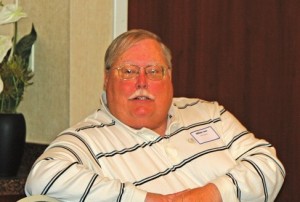
Nonetheless, he said, CVB turned down BC Baseball’s request for an allocation from the Sports Development Fund to promote its tournaments.
“We have dropped in our annual visitors by 3,000 people, and our costs at parks and recreational fields have at least doubled,” he said. BC Baseball has moved a few tournaments to St. Louis and Lake of the Ozarks where the group received cut rates for field rental.
Amy Schneider, the CVB’s interim director, said they are open to the idea of expanding the qualifications for receiving money from the fund.
